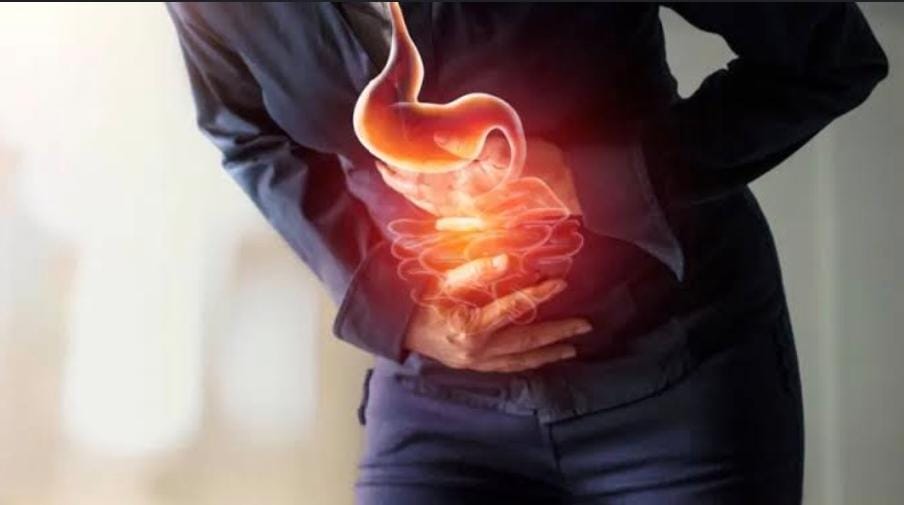“Not All Inflammation Is Fiery — One Type Freezes You From Within!”

Everyone talks about inflammation as if it’s all about heat, redness, and pain. But what if your body is inflamed — and you don’t even feel the fire? In Ayurveda, there are two distinct types of inflammation: One burns, the other clogs. And the sluggish one is quietly ruining your metabolism. 🌡️ The Two Faces of Inflammation: Explained Ayurvedically 1️⃣ Heating-Type Inflammation (Pitta Dominant) This is the classic kind you’ve heard about. 🔥 Hot, red, swollen, painful 🔥 Seen in acne, gastritis, ulcers, joint swelling, skin rashes 🔥 Feels like the body is inflamed — visibly and painfully What’s happening: Excess pitta (fire element) is raging in the tissues. Your agni (digestive fire) is high, but it’s misdirected, burning the wrong tissues. ⚠️ Clues: Burning sensation in stomach or skin Irritability, anger Thirst, heat intolerance Red acne, inflammatory rashes Ayurvedic solution: Cool the fire, soothe the tissues, pacify pitta. 2️⃣ Sluggish-Type Inflammation (Kapha-Ama Dominant) This one is silent, sticky, and dangerous. 🧊 You feel tired all the time 🧊 Digestion is slow and heavy 🧊 You gain weight without explanation 🧊 Brain fog, bloating, puffiness 🧊 No fire… just fatigue What’s happening: Agni is weak. Ama (toxic residue) accumulates in the gut and channels. Instead of burning tissues, it blocks them—slowing everything down. ⚠️ Common in thyroid issues, PCOS, insulin resistance, chronic fatigue. Ayurvedic solution: Rekindle digestive fire, dry out the stickiness, detox gently. 🌿 So… Not All Inflammation Needs Cooling! Some of it needs drying. Some of it needs rekindling. Some of it doesn’t need suppression — it needs direction. “If you treat cold inflammation with cold remedies, you’re only freezing your healing.” Ayurveda doesn’t fight fire with water. It understands the root — and balances the flame.
Loose Motions Daily? Your Gut’s Not Infected, It’s Inflamed

As an Ayurvedic physician, I want to share an important truth — most diarrhoea cases today are not caused by bacteria or viruses, but by internal inflammation and faulty digestion. Here’s what’s happening inside: 📍The Real Culprits Behind 90% of Loose Motions Today: 🥺These foods disturb your Agni (digestive fire), leading to Ajeerna (indigestion) and Pitta-Kapha inflammation in the gut !!! Your Gut Isn’t Infected — It’s Inflamed !!! This results in: ☘️Ayurvedic Perspective: Such diarrhoea is your body’s cry for detox and dosha balance, not a cue for antibiotics or random pills. Suppressing it worsens malabsorption, IBS, and even skin disorders !!! The Solution? 📍Restore & Rebuild: 📍Eliminate inflammatory foods for at least 3–6 weeks Start a guided gut reset plan based on your prakriti. If diarrhoea is part of your daily struggle, it’s time to stop masking and start healing !!!
Bloating Isn’t Just a Gut Issue. It’s an Agni Emergency!!!

📍Stop blaming hormones—start reviving your digestive fire. As an Ayurvedic physician, I want to clear this up: Here’s what’s really behind your daily bloating (and why your gut resets aren’t working): 📍Drinking cold water or smoothies first thing in the morning. 📍Eating raw foods, salads, or fruits when your body wants warmth. 📍Mixing incompatible foods (milk + fruit, curd + fish?)—a direct ticket to Ama (toxins). 📍Eating while anxious, distracted, or scrolling. 📍Skipping breakfast or having coffee on an empty stomach. 📍Eating without true hunger (jatharagni works on a rhythm, not impulse). 📍Constant snacking—your digestive fire never gets to rest. 📍Ignoring the dinacharya (daily rhythm) that aligns your digestion with the sun. 📍Late-night meals—your body’s ready to detox, not digest. 📍Overuse of pills, supplements, or laxatives—further dulling your natural digestive intelligence. ☘️In Ayurveda, bloating is a symptom. The real problem? Until these are corrected, no gut cleanse or low-FODMAP diet will truly help. ☘️Want to de-bloat naturally? Begin by resetting your Agni, not by skipping meals or blaming hormones. Tap the link / Save this post. Your gut deserves ancient solutions, not modern confusion !!!
“I’ve done it all… nothing works” – the silent killer of true healing.

Let’s talk about one sentence most experts silently dread: “I’ve tried everything. What’s new in your approach?” Here is the truth. Ayurveda isn”t your kitchen orchestra !!! ❌It’s not a playlist of turmeric lattes, jeera water, and Pinterest remedies !!! ✅ It’s a science—rooted in clinical experience, personalized diagnosis, deep detoxes, and powerful herbs that most kitchens have never seen. ♻️ Ayurveda has answers you haven’t evenasked yet. So if you say you’ve “tried everything,” ask yourself: 1.Have you understood your prakriti (body constitution)? 2.Have you gone through a proper diagnosis, pulse reading, or nadi pariksha? 3.Have you removed the ama (toxins) that’s clouding your digestion and mind? 4.Have you given time for cellular regeneration, or are you chasing quick fixes? One of our lecturers, a university rank holder, once told me: “I started studying Ayurveda at 18. I’m still learning today.” She said this when we were just entering college. Her humility taught me a lot !!! So let’s be clear: If you already ‘know everything,’ then why are you still suffering? ✅True healing needs an empty cup. ✅ You must unlearn to re-learn. ✅You need a vaidya—a trained physician. ❎Not just a kitchen-savvy influencer with aesthetic reels. Yes, home remedies have their place—but they are supportive tools, not full treatments. Sometimes, those very kitchen hacks can worsen your symptoms !!! If used at the wrong time, for the wrong condition. ✅You deserve better than band-aid fixes. ✅You need root-cause healing. ✅You need a system that understands you—your body, your journey, your imbalances. ✅You need an expert. Not a guess !!!
Why bloating returns after Laxatives – and how ayurveda breaks the cycle !!!

In Ayurvedic terms, your experience of feeling bloated again 1–2 hours after taking laxatives can be explained through the lens of Vata imbalance, especially Apana Vata and Samana Vata dysfunction. Here’s a breakdown: Laxatives force Apana Vata (the downward-moving subdosha responsible for bowel movements) to act. This gives temporary relief. However, this is not a natural or balanced correction. It doesn’t pacify Vata, it only stimulates it forcefully. Once the laxative’s effect fades, Vata gets even more disturbed. This disturbance spreads to Samana Vata (responsible for digestion in the gut) and weakens Agni (digestive fire), leading to: 🤢Incomplete digestion 😈Ama (toxins) formation Gas accumulation 😧Recurrent bloating Laxatives don’t correct the root issues such as: This leads to a cycle where the bowel needs stimulation but never strengthens naturally. Each time you feel okay, Vata becomes more erratic, leaving you with bloating again !!! ☘️Ayurvedic Recommendation: To break the cycle: ☘️Strengthen Agni with ginger tea, ajwain, or hing-based formulations !!!
Acid Belching, Loose Motions, Eczema? Check Your Fermented Intake!!!

Is Fermented Porridge Meant for Everyone? Actually, No — and Here’s Why. Fermented foods, including fermented porridge (Pezh or Kanji), have gained popularity for their probiotic benefits. While they can indeed aid digestion and improve gut flora in certain individuals, they are not suitable for all body types or health conditions—especially from an Ayurvedic perspective. Why Can Fermented Porridge Be Harmful? Fermentation increases the acidic nature (amla rasa) of food. This, when consumed excessively or by those with certain imbalances, can aggravate pitta and kapha doshas, leading to inflammation and metabolic disturbances. Instead of nourishing, it may contribute to the accumulation of ama (toxins), heat, and dampness in the body. Who Should Avoid Fermented Porridge? – These individuals already have high internal heat and acidity. Fermented foods further elevate pitta, leading to inflammatory symptoms. – Especially those with conditions like rheumatoid arthritis, ulcerative colitis, Hashimoto’s thyroiditis, or lupus, where inflammation is already a concern. So, Is Fermented Porridge Bad? Not at all — but it must be used judiciously, based on your prakriti (body constitution), vikriti (current imbalance), climate, season, and digestive strength (agni). Safer Alternatives: If you crave fermented foods, choose milder options like well-cooked kanji diluted with buttermilk and tempered with cumin in small amounts. Or opt for freshly prepared gruels with digestive herbs like ginger, cumin, or ajwain. As an Ayurvedic physician, my advice is simple: What suits one person can aggravate another. Always listen to your body, honor your constitution, and avoid the trap of blindly following food trends !!!
Inflammation Isn’t Just From Junk – It’s From the Wrong Combinations

Still Confused About Inflammatory Foods? Let’s Break It Down. Certain foods, especially when combined incorrectly, can silently trigger inflammation in your body. One such example is cow’s milk, which is already heavy and difficult for the human gut to digest. When combined with fruits—a practice common in smoothies or desserts—it becomes viruddhahara in Ayurveda. This incompatible combination creates ama (undigested toxins), which tend to accumulate in weaker areas of the body like joints, triggering aches, pains, and stiffness. Now think about a typical “fancy” breakfast: croissant, butter, meat, and eggs. All of these are kapha-heavy foods. Together, they overload the digestive fire (agni), slow down metabolism, and again lead to the formation of ama. What follows? Sluggishness, bloating, acidity, and a general sense of heaviness or fatigue—classic signs that you’ve eaten something inflammatory for your system. These hidden food triggers and poor combinations are often at the root of: Recurrent cystic acne Chronic boils or abscesses Early signs of aging Autoimmune conditions like Hashimoto’s, thyroiditis, psoriasis, Graves’ disease, SLE, and rheumatoid arthritis They don’t just affect the gut. Their ripple effect is seen on the skin and the mind, causing: Itching and rashes Heat sensations Brain fog and fatigue That all-too-familiar food coma With fusion foods, global cuisines, and fast-paced eating trends, it’s easy to forget the basics of food compatibility. But Ayurveda reminds us that how foods are combined matters just as much as what foods are eaten. Avoiding incompatible combinations can be a game-changer for your health !!!
“Bloating After Healthy Food? Your Gut is Begging for Help (Ayurveda Has the Answer)”

Are you suddenly reacting to foods you once loved — even healthy ones like fruits, dals, or cooked veggies? Do you feel gassy, bloated, or sluggish after meals? Ayurveda calls this a sign of weakened Agni (digestive fire) and rising Ama (toxins). When your gut intelligence breaks down, even the purest foods become hard to digest. This isn’t a food allergy — it’s a cry from your gut for balance. Common signs your Agni is disturbed: Bloating, gas, heaviness after meals Constipation or loose motions White coating on the tongue Low energy and brain fog Frequent belching or acidity Here’s what you can do (the Ayurvedic way): Sip ginger-cumin tea before meals to awaken Agni Stick to warm, home-cooked meals at regular timings Do a gentle gut reset with detox herbs and abhyanga (oil massage) Take buttermilk with roasted cumin daily — the ultimate Ayurvedic probiotic Practice mindfulness — your gut responds to your emotions too. Let your gut feel light, strong, and vibrant again — naturally.
Why ‘Normal’ Thyroid Reports Aren’t the End of the Story”

TSH is Normal, But You Don’t Feel Normal? Here’s What Ayurveda Wants You to Know: Even if your reports say “normal,” if you’re feeling tired, heavy, low, or foggy — your inner vitality (ojas) might be depleted. And ojas isn’t found in blood tests — it’s felt in your energy, glow, and zest for life !!! Ayurveda looks at the digestive fire (agni) as the root of all hormonal harmony. Low agni = low metabolism = fatigue, weight gain, sluggish mood, and hair fall. Even with “normal” TSH, if your agni is dull, you’ll feel off. Your thyroid doesn’t work alone. A congested liver, toxic gut, or suppressed emotions can all mimic or trigger thyroid-like symptoms. Ayurveda treats the whole system, not just the gland. Late nights, irregular meals, skipping oil massages, not syncing with the seasons — these all imbalance vata, which plays a big role in hair fall, mood swings, dry skin, and tiredness even when your labs are fine. Your thyroid might look fine, but what about your prana (life force)? Your manas (mind)? Your sharira bala (physical strength)? Ayurveda checks the pulse beyond numbers — into your sleep, emotions, hunger, and skin tone. Many women are told “you’re fine” just because labs are okay. But you know your body. If you feel not fine, Ayurveda believes you. And we look for root causes, not just reference ranges. Whether it’s dry skin, bloating, low energy, or hair thinning — these are messages from your body. Ayurveda listens to them, interprets them, and brings your system back into balance — gently and deeply !!!
The Real Ayurvedic Journey : My daily Confession

Being a first-generation Ayurvedic doctor with no family legacy, no glamorous clinic, and no ancestral name to back me is hard. But you know what’s harder? → Watching someone with hypothyroidism take thyroid pills for 10 years straight without ever being told why their body stopped functioning naturally in the first place. → Seeing young women with severe hair fall invest in 10+ chemical shampoos and serums — But never address their gut health, sleep, or mental stress. → Getting tagged in posts that say “Take ashwagandha for thyroid” like it’s a magical fix — without any personalization, prakriti analysis, or food correction. → Hearing “My TSH is normal, but I still feel tired, bloated, and hair is falling like crazy” — and knowing they’re trapped in symptom management, not root healing. → Watching influencers do “hair care routines” with exotic oils, while skipping breakfast, sleeping past midnight, and surviving on coffee and salads. → People thinking a hair pack will solve chronic hair fall when the root issue is a sluggish liver, low iron, or unprocessed emotional stress. → Getting told “Ayurveda is slow” by someone who tried one herbal pill for a week and expected magic — While ignoring years of imbalance and lifestyle damage. → Being asked to “send a quick herb” for complex autoimmune issues or hormonal imbalances like thyroid — As if ancient wisdom is now a shortcut service. → Seeing women lose their hair, confidence, and energy after childbirth — And being told it’s “normal” and nothing can be done. (When Ayurveda has entire postpartum protocols for nourishment and repair.) → Fighting the image that real Ayurveda is only for retreats, detoxes, and pretty reels — When it’s actually deep, layered, and rooted in real life. Because today, being an Ayurvedic doctor isn’t just about healing. It’s about defending a science that’s been misused, misunderstood, and marketed into oblivion. We’re not selling overnight glow-ups. We’re restoring balance — one patient, one protocol, one honest conversation at a time.
